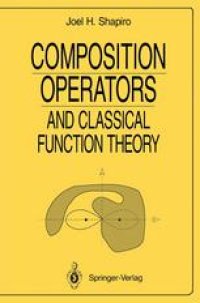
Ebook: Composition Operators: and Classical Function Theory
Author: Joel H. Shapiro (auth.)
- Tags: Analysis
- Series: Universitext: Tracts in Mathematics
- Year: 1993
- Publisher: Springer-Verlag New York
- Edition: 1
- Language: English
- pdf
The study of composition operators links some of the most basic questions you can ask about linear operators with beautiful classical results from analytic-function theory. The process invests old theorems with new mean ings, and bestows upon functional analysis an intriguing class of concrete linear operators. Best of all, the subject can be appreciated by anyone with an interest in function theory or functional analysis, and a background roughly equivalent to the following twelve chapters of Rudin's textbook Real and Complex Analysis [Rdn '87]: Chapters 1-7 (measure and integra tion, LP spaces, basic Hilbert and Banach space theory), and 10-14 (basic function theory through the Riemann Mapping Theorem). In this book I introduce the reader to both the theory of composition operators, and the classical results that form its infrastructure. I develop the subject in a way that emphasizes its geometric content, staying as much as possible within the prerequisites set out in the twelve fundamental chapters of Rudin's book. Although much of the material on operators is quite recent, this book is not intended to be an exhaustive survey. It is, quite simply, an invitation to join in the fun. The story goes something like this.
The study of composition operators forges links between fundamental properties of linear operators and beautiful results from the classical theory of analytic functions. This book provides a self-contained introduction to both the subject and its function-theoretic underpinnings. The development is geometrically motivated, and accessible to anyone who has studied basic graduate-level real and complex analysis. The work explores how operator-theoretic issues such as boundedness, compactness, and cyclicity evolve - in the setting of composition operators on the Hilbert space H2 into questions about subordination, value distribution, angular derivatives, iteration, and functional equations. Each of these classical topics is developed fully, and particular attention is paid to their common geometric heritage as descendants of the Schwarz Lemma.
The study of composition operators forges links between fundamental properties of linear operators and beautiful results from the classical theory of analytic functions. This book provides a self-contained introduction to both the subject and its function-theoretic underpinnings. The development is geometrically motivated, and accessible to anyone who has studied basic graduate-level real and complex analysis. The work explores how operator-theoretic issues such as boundedness, compactness, and cyclicity evolve - in the setting of composition operators on the Hilbert space H2 into questions about subordination, value distribution, angular derivatives, iteration, and functional equations. Each of these classical topics is developed fully, and particular attention is paid to their common geometric heritage as descendants of the Schwarz Lemma.
Content:
Front Matter....Pages i-xvi
Linear Fractional Prologue....Pages 1-8
Littlewood’s Theorem....Pages 9-20
Compactness: Introduction....Pages 21-35
Compactness and Univalence....Pages 37-53
The Angular Derivative....Pages 55-76
Angular Derivatives and Iteration....Pages 77-87
Compactness and Eigenfunctions....Pages 89-105
Linear Fractional Cyclicity....Pages 107-128
Cyclicity and Models....Pages 129-145
Compactness from Models....Pages 147-175
Compactness: General Case....Pages 177-197
Back Matter....Pages 199-224
The study of composition operators forges links between fundamental properties of linear operators and beautiful results from the classical theory of analytic functions. This book provides a self-contained introduction to both the subject and its function-theoretic underpinnings. The development is geometrically motivated, and accessible to anyone who has studied basic graduate-level real and complex analysis. The work explores how operator-theoretic issues such as boundedness, compactness, and cyclicity evolve - in the setting of composition operators on the Hilbert space H2 into questions about subordination, value distribution, angular derivatives, iteration, and functional equations. Each of these classical topics is developed fully, and particular attention is paid to their common geometric heritage as descendants of the Schwarz Lemma.
Content:
Front Matter....Pages i-xvi
Linear Fractional Prologue....Pages 1-8
Littlewood’s Theorem....Pages 9-20
Compactness: Introduction....Pages 21-35
Compactness and Univalence....Pages 37-53
The Angular Derivative....Pages 55-76
Angular Derivatives and Iteration....Pages 77-87
Compactness and Eigenfunctions....Pages 89-105
Linear Fractional Cyclicity....Pages 107-128
Cyclicity and Models....Pages 129-145
Compactness from Models....Pages 147-175
Compactness: General Case....Pages 177-197
Back Matter....Pages 199-224
....